VJ Day: Wales marks 75 years since end of World War Two
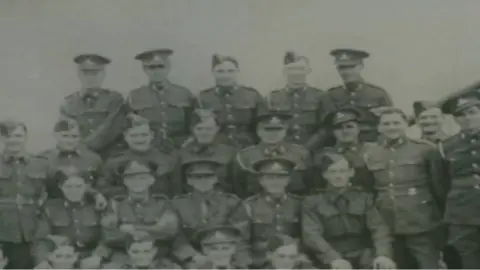 Nigel Gabriel
Nigel Gabriel "He was made to stand outside naked all night in winter and they were amazed he survived that."
Nigel Gabriel's father Reg was among the prisoners of war captured and forced to carry out labour under horrific conditions.
Victory over Japan Day - the date when Japan surrendered in 1945, marking the end of World War Two - will be marked with services across Wales later.
Mr Gabriel, of Cardiff, said: "We owe them a debt of honour and gratitude."
Reg Gabriel, from Ynysybwl, Rhondda Cynon Taff, was a bombardier in the 77th Regiment of the Royal Artillery - an anti-aircraft regiment.
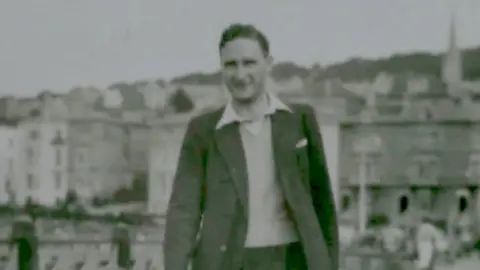 Family photo
Family photoIn 1942, initially due to be deployed to Basra in Iraq, he was diverted to Singapore but it had fallen into enemy hands by the time he arrived.
Following a battle in the Java Sea, he and his fellow soldiers were captured and sent to a labour camp for a year before being moved to Japan on what were known as "hell ships" due to the conditions prisoners suffered.
There, they worked in mines and in factories and it was at one of these factories in Wakayama where he was forced to spend a winter's night outside naked for what his son called "a minor infringement".
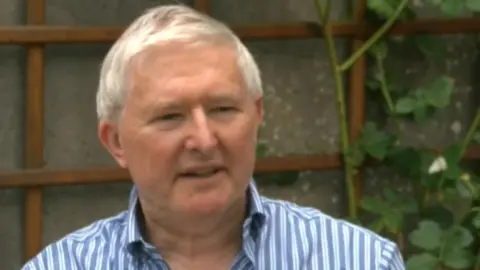
When the atomic bomb was dropped on Hiroshima - about 250 miles (400km) away - the Japanese vacated the camp where he was being held, enabling him to begin his journey home.
His son said: "He was a tough guy - he lived to be 92 - but it was nuanced. There were Japanese people who were kind, there were Japanese people who were very unkind."
Mr Gabriel said his father "never took any interest whatsoever" in VJ Day having felt soldiers in the Far East "had, to some extent, been neglected".
But, he added: "He cherished the memory of his comrades. Those people exhibited bravery and courage and they gave everything they had and we owe them a huge debt of gratitude."
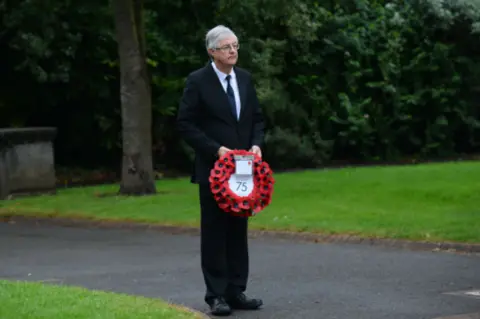
How is Wales marking the anniversary?
At a pre-recorded national service of thanksgiving at Llandaff Cathedral - carried out without a congregation due to coronavirus - the Archbishop of Wales John Davies said he hoped people continued "to work for and call for a world where brutality and ignorance lie in the dust, defeated by the noble quest for justice and truth, and for freedom from tyranny in any shape or form".

There will also be services and commemorations across Wales, including in Pontypool Park, Torfaen, the raising of a flag at County Hall in Ruthin, Denbighshire, and a display of thousands of poppies made by parishioners will be on show at St Giles Church, Wrexham.
Weather conditions forced the Red Arrows to cancel a fly over at Cardiff, as part of the first UK-wide flypast since the 2012 Olympic and Paralympic games in London.
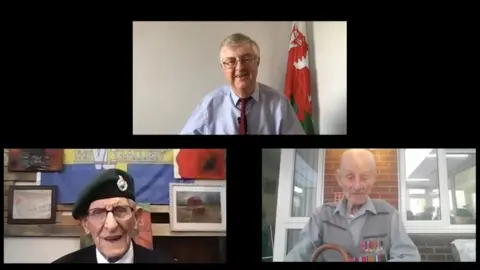 Welsh Government
Welsh GovernmentFirst Minister Mark Drakeford, who laid a wreath at a ceremony in Cardiff on Saturday, earlier spoke to veterans Walford Hughes, now aged 100, and Ted Owens, 94, and said their stories would stay with him forever.
Mr Drakeford said for all those who survived - military and civilians - "the wounds of war were etched firmly in their psyche for good".
"After the elation of VE day, some Welsh troops who survived the Far East felt like the 'Forgotten Army'," said Mr Drakeford.
"They had served so far away, cut off from their loved ones and any contact with the world they had known.
"The focus at home had firmly been on Europe; they could be forgiven for thinking their efforts had been forgotten."

Stephen John from Newport, who has spent more than eight years researching the battalion Bombardier Gabriel belonged to, said there was "a bit of a furore" surrounding the return of serviceman from Asia.
As Germany had surrendered three months earlier, and with Britain's cities still recovering from German bombing raids, Mr John said there was a feeling the public "did not need reminding" of the horrors of war.
"When they were coming back, they were given a formal letter which basically was: 'Don't talk about your experiences'.
"Many servicemen - not even to their family members - talked about what happened to them, so that was bottled up.
"When you talk to families or children of prisoners of war, they understand the rage and the nightmares and the beatings that happened because their father couldn't cope with coming back to civvy life."

What happened in 1945?
Germany surrendered to Allied forces in May 1945, but World War Two continued in Asia as the Allies fought imperial Japan.
The United States believed that dropping a nuclear bomb - after Tokyo rejected an earlier ultimatum for peace - would force a quick surrender without risking US casualties on the ground.
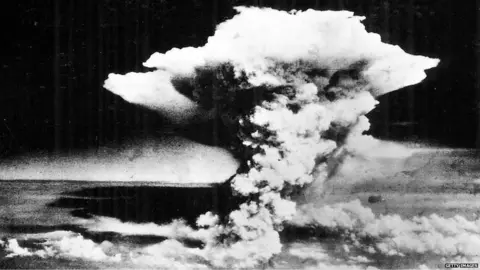 Getty Images
Getty ImagesOn 6 August, the US dropped the first bomb - codenamed Little Boy - on Hiroshima. The attack was the first time a nuclear weapon was used during a war.
At least 70,000 people are believed to have been killed immediately in the massive blast which flattened the city. Tens of thousands more died of injuries caused by radiation poisoning in the following days, weeks and months.
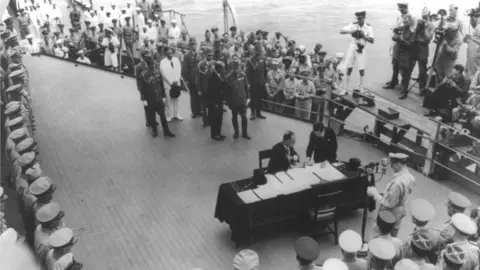 Library of Congress via European Photopress Agency
Library of Congress via European Photopress AgencyWhen no immediate surrender came from the Japanese, another bomb, dubbed "Fat Man", was dropped three days later about 261 miles (420km) to the south over Nagasaki.
The recorded death tolls are estimates, but it is thought that about 140,000 of Hiroshima's 350,000 population were killed, and that at least 74,000 people died in Nagasaki.
They are the only two nuclear bombs ever to have been deployed outside testing. The dual bombings brought about an abrupt end to the war in Asia, with Japan surrendering to the Allies on 14 August 1945.
